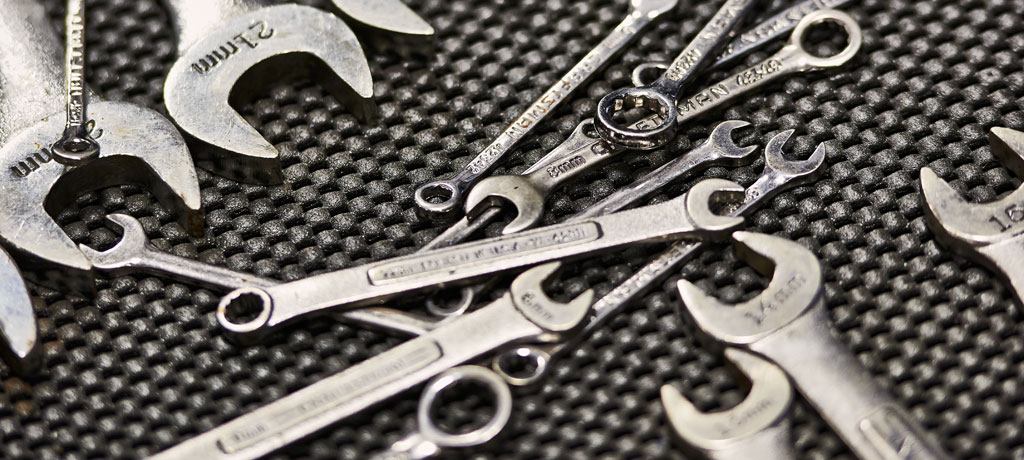You already know your car cannot function safely without sturdy and properly fit wheels. A wheel is complex, and several components must be integrated for it to function safely—including the bearings.
If you’re driving on the highway and a wheel breaks off, it’s because a wheel bearing failed. What are the signs of a bad wheel bearing, and what can you do about it? Here, we explore wheel bearings, including what they are, how they work, and how to tell if they’re about to fall off.
What Is a Wheel Bearing?
A wheel bearing is a set of steel balls held together in a metal ring called a race. The race is located inside the hub, and each wheel has one. At the center of the wheel is a hollow piece of metal called a hub. The wheel bearings fit tightly inside this hub and ride on a metal axle shaft, helping reduce friction when the wheel spins.
Keep in mind that wheel bearings are not the same as engine bearings, as there is no constant source of lubrication for wheel bearings. This means they must be tight enough to keep water and road dust out. They also support the entire vehicle weight while driving, so they endure abuse from rough roads and potholes, as well as lateral forces when turning.
How Long Do Wheel Bearings Last?
While most estimates suggest wheel bearings should last between 75,000 and 150,000 miles, the actual lifespan depends on:
- Quality of the bearings
- Weather conditions (e.g., rain, dust, deep water)
- Road conditions (e.g., potholes, speed bumps)
What Causes Bad Wheel Bearings?
Besides the factors listed above, weak wheel bearings can also be caused by:
- Faulty Installation: The right way to install wheel bearings is in accordance with manufacturer guidelines. If they’re not properly installed, this increases the chances of an accident.
- Unbalanced Tires: An unbalanced tire will inflict more strain on wheel bearings, forcing them to work harder than they should.
- Overweight Loads: You can damage the wheel bearings by hauling more than a vehicle’s capacity. Wheel bearings have to support the weight of a load—so if the weight is excessive, the bearings will wear out quickly.
Bad Wheel Bearing Symptoms
What are the signs of a bad wheel bearing? Here are six critical signs indicating your wheel bearing may be defective:
- Unusual Noises: What does a bad wheel bearing sound like? If you notice a grinding or grating noise from your wheel or tire, you might have a bad wheel bearing—especially if the noise gets louder as the vehicle accelerates.
- Loose Steering: Looseness can be difficult to convey, but in this case, it refers to steering your car and noticing it to be less responsive or precise than usual.
- Uneven Tire Wear: When a wheel bearing wears down, the effects will likely extend to your tires. Rotating your tires regularly can prevent wear, but if you have extremely uneven wear, inspect the wheel bearings.
- Brake Issues: If your bearings are weak, you might notice inefficient braking or brake slips as you drive. When bearings become loose, the rotors push the piston further when you tap on the brakes, making them feel weak.
- ABS Light: If your brakes or tires receive excessive pressure because of loose wheel bearings, this can cause the ABS light to illuminate. While an ABS light may not always indicate a loose bearing, a simple code check can help identify the culprit.
- Steering Wheel Vibrations: Besides a loose steering wheel, vibration can also indicate a bad wheel bearing. Over time, a bad wheel bearing will intensify bearing play on your wheels, especially when making turns or driving at high speeds.
How to Identify a Bad Wheel Bearing Noise
Here are common noises that suggest bad wheel bearings:
- Humming: A humming noise while driving can be caused by several issues, but a wheel bearing or CV joint is one of the more likely (and problematic) issues.
- Squealing & Growling: The classic sounds of a bad wheel bearing are cyclic chirping, squealing, and growling noises. You can verify the sound is related to wheel bearings if it changes in proportion to vehicle speed.
- Howling: Howling that solely occurs during deceleration indicates loose pinion-bearing preload. If howling happens under acceleration at different speeds, then it’s probably worn-out gears. However, worn-out bearings also make a howling noise when they don’t support the gears correctly.
What to Do If Your Wheel Bearing Is Bad
The best advice is to head to your nearest auto shop that offers wheel repair and replacement services. If you’re on the road, slow down steadily and avoid turning rapidly. If you drive long distances on a bad wheel bearing, you’ll eventually lose control of the vehicle, and the wheel will stop suddenly.
If you want to know how to check for a bad wheel bearing, place your car on a jack stand, grip your hands on the 6 and 12 o’clock positions of the tire, and then spin the wheel to see if it wiggles. It’s also a great way to learn how to tell which wheel bearing is bad.
Regardless of which bearing is the culprit, avoid being on the road for too long.
The amount of miles your vehicle can endure will depend on how extensive the damage is and the conditions on the road. If you’re concerned about replacement costs, note that the average estimate for a replacement is about $350 for each bearing.
The exact estimates will depend on:
- The make and model of your vehicle
- Type of bearing
- Parts and labor
Get Your Wheel Bearings Replaced at Meineke
If you notice signs of a bad wheel bearing, visit your nearest Meineke location. Once you bring your vehicle to us, we’ll perform a thorough diagnosis to honestly determine if a replacement is necessary.






